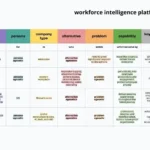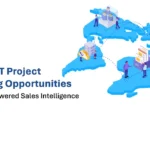Data-Driven Sales Strategies for 2025 are crucial for staying competitive. These strategies rely on insights from data to boost sales.
In today’s fast-paced market, data is key. Businesses need to use data to make smart sales decisions. This helps them understand customer needs and trends. By 2025, using data effectively will be even more important. Companies that adopt data-driven strategies will likely outperform their competitors.
They will make better decisions and improve customer satisfaction. In this blog, we will explore how you can use data to enhance your sales strategies for 2025. Get ready to learn how data can transform your sales approach and help you stay ahead in the game.
Table of Contents
ToggleIntroduction To Data-driven Sales
Data-driven sales strategies have become essential. Sales teams now rely on data for decision-making. In 2025, this trend will intensify. Businesses must adapt to thrive in this evolving landscape.
Importance In 2025
Data will be more critical than ever. It guides sales teams to target the right customers. Accurate data helps understand customer needs. This leads to better sales outcomes. Data-driven strategies ensure efficient resource allocation. They minimize wasted efforts and maximize returns.
Evolving Sales Landscape
The sales landscape is changing fast. Technology is driving these changes. AI and machine learning play a big role. They help analyze large amounts of data. This analysis provides valuable insights. Sales teams can then make informed decisions. Customer preferences are also shifting. Personalization is now expected. Data-driven strategies enable personalized experiences. Meeting customer expectations becomes easier. AI sales intelligence is becoming increasingly important in this evolving landscape. It allows sales teams to gain a deeper understanding of customer behavior and preferences. By harnessing the power of AI sales intelligence, businesses can make smarter, more strategic decisions that ultimately lead to greater sales success.
Leveraging Big Data
Leveraging Big Data in sales strategies for 2025 can transform how businesses operate. Big Data provides valuable insights that can drive sales and enhance customer relationships. Using data, companies can understand customer needs and preferences better. This leads to more personalized and effective sales approaches.
Data Collection Methods
Effective data collection is the first step in leveraging Big Data. Businesses use various methods to gather data. Customer surveys can provide direct feedback. Social media monitoring tracks customer sentiment. Website analytics reveal user behavior on the site. CRM systems collect data on customer interactions. Each method offers unique insights into customer preferences and behaviors.
Analyzing Customer Behavior
Analyzing customer behavior helps businesses predict future actions. Patterns in purchase history reveal what customers like. Website navigation data shows what interests them. Social media interactions indicate their preferences. This analysis allows businesses to tailor their sales strategies. Personalizing offers based on this data can increase conversion rates. Understanding customer behavior is key to successful sales strategies.
Predictive Analytics
Predictive analytics uses data to forecast future events. It helps businesses make informed decisions. In sales, predictive analytics is a powerful tool. It can transform how companies operate. Let’s explore how it can improve sales strategies in 2025.
Forecasting Sales Trends
Predictive analytics can help forecast sales trends. It analyzes historical data to predict future sales patterns. This allows businesses to prepare for demand changes. Here are some benefits:
- Optimizing inventory levels
- Reducing stockouts and overstock situations
- Improving customer satisfaction
Using predictive models, companies can adjust their strategies. This leads to better resource allocation and increased profits.
Identifying Potential Leads
Predictive analytics can also identify potential leads. It analyzes customer data to find patterns. This helps sales teams target the right prospects. Key benefits include:
- Increasing conversion rates
- Saving time and resources
- Enhancing sales team productivity
By focusing on high-potential leads, businesses can improve their sales performance. This leads to a more efficient sales process and higher revenue.

Credit: www.cmswire.com
Ai And Machine Learning
AI and Machine Learning are changing how businesses approach sales. These technologies help companies make better decisions using data. They improve efficiency and customer satisfaction. In 2025, data-driven sales strategies will rely heavily on AI and Machine Learning.
Automating Sales Processes
AI can automate many sales tasks. It can handle data entry, scheduling, and follow-ups. Sales teams can focus on building relationships. Automated systems can analyze data quickly. They identify the best sales opportunities. This makes the sales process faster and more efficient.
Enhancing Customer Interactions
Machine Learning helps personalize customer interactions. AI can analyze customer behavior. It predicts what customers want. Sales teams can offer personalized recommendations. This improves customer satisfaction and loyalty. AI can also provide real-time responses to customer inquiries. This ensures customers get help quickly.
Personalization Techniques
Personalization techniques in sales strategies are essential for 2025. Businesses must cater to individual customer needs. This approach builds strong relationships and boosts sales. By understanding customer behavior, companies can offer tailored experiences. Below are some key personalization techniques.
Tailored Marketing Campaigns
Tailored marketing campaigns focus on specific customer interests. Companies can use data to understand customer preferences. This helps in creating personalized messages and offers. Personalized emails and ads can grab attention. Customers are more likely to respond to relevant content. Using purchase history and browsing behavior is crucial. It allows businesses to send targeted promotions. This increases the chances of conversion.
Customer Segmentation
Customer segmentation divides the customer base into groups. Each group shares common characteristics. This can be based on demographics, behaviors, or purchase history. Segmentation helps in creating personalized experiences. Businesses can address the unique needs of each segment. It allows for more effective communication and marketing efforts. This leads to better customer satisfaction and loyalty.
Using data analytics is key for accurate segmentation. It helps identify patterns and trends among customers. Companies can then tailor their strategies for each segment. This ensures that marketing efforts are relevant and impactful. In the end, customer segmentation improves overall sales performance.

Credit: samhub.io
Integrating Crm Systems
Integrating CRM systems into sales strategies is essential for businesses in 2025. A CRM system helps manage customer interactions. It also collects valuable data. This data aids in making informed decisions. By utilizing a CRM system, sales teams can improve efficiency. They can also enhance customer relationships. Let’s explore how integrating CRM systems streamlines operations and boosts collaboration.
Streamlining Sales Operations
CRM systems automate repetitive tasks. This saves time for sales teams. Automated follow-ups ensure no opportunity is missed. Sales teams can focus on closing deals. They no longer need to worry about data entry. CRM systems also provide real-time analytics. These analytics help in making quick decisions. This is crucial in a fast-paced market.
Another benefit is centralized data storage. All customer information is in one place. Sales teams can access it easily. This reduces the chance of errors. It also improves the customer experience. Customers appreciate quick responses. They value accurate information. Integrating CRM systems makes this possible.
Improving Team Collaboration
CRM systems enhance team collaboration. They provide a shared platform. Team members can share insights easily. They can also track progress on deals. This transparency fosters teamwork. Everyone knows what others are working on. This reduces duplication of efforts.
Communication is also improved. CRM systems offer built-in messaging features. Team members can communicate instantly. They can resolve issues quickly. This speeds up the sales process. It also ensures a unified approach to customer service. Customers receive consistent information. They feel valued and understood.
Performance Metrics
In 2025, data-driven sales strategies will focus on analyzing key performance metrics. Understanding these metrics helps businesses make better decisions. They can improve sales processes and achieve higher revenue. This section explores the important aspects of performance metrics. Analyzing essential ecommerce metrics such as conversion rate, average order value, and customer acquisition cost will be crucial for driving sales in 2025. These metrics provide valuable insights into customer behavior, purchasing patterns, and the effectiveness of marketing campaigns. By leveraging this data, businesses can optimize their online sales strategies and drive greater overall success.
Key Sales Kpis
Key Performance Indicators (KPIs) are essential for tracking sales performance. They measure the effectiveness of sales strategies. Here are some vital sales KPIs:
- Conversion Rate: The percentage of leads that become customers.
- Average Deal Size: The average revenue per closed deal.
- Sales Cycle Length: The time taken to close a deal.
- Customer Acquisition Cost (CAC): The cost to acquire a new customer.
- Customer Lifetime Value (CLV): The total revenue from a customer over time.
Using these KPIs helps businesses identify strengths and weaknesses in their sales processes. They can focus on areas needing improvement and enhance overall sales performance.
Real-time Data Monitoring
Real-time data monitoring is crucial for data-driven sales strategies. It involves tracking sales metrics as they happen. This offers several benefits:
- Immediate insights into sales performance.
- Quick identification of issues or opportunities.
- Better decision-making based on current data.
Sales teams can use various tools for real-time monitoring. These tools provide dashboards and visualizations. They help teams stay updated and make quick adjustments.
| Tool | Feature |
|---|---|
| CRM Software | Tracks leads, deals, and customer interactions. |
| Analytics Platforms | Provides data visualization and reporting. |
| Sales Dashboards | Offers real-time metrics and KPIs. |
Incorporating real-time data monitoring ensures that sales teams always have the latest information. This boosts their ability to respond to market changes and customer needs effectively.
How Can Data-Driven Sales Strategies Incorporate Ai-Driven CRM Trends for Business Success in 2025?
In 2025, aidriven crm trends 2025 will play a crucial role in data-driven sales strategies for businesses. By leveraging AI technology in CRM systems, companies can gain valuable insights into customer behavior, improve sales forecasting, and personalize marketing efforts. This integration will lead to more efficient and effective sales processes, driving business success.
Future Trends In Data-driven Sales
As we approach 2025, data-driven sales strategies will be more crucial than ever. Businesses will need to harness the power of data to stay competitive. This means embracing new technologies and staying adaptable to market shifts. Below, we explore the future trends in data-driven sales.
Emerging Technologies
New technologies will transform how companies collect and analyze sales data. Artificial Intelligence (AI) will play a big role. AI can predict customer behavior and optimize sales processes. Machine learning (ML) will help in identifying sales patterns. This can lead to better decision-making.
Another key technology is the Internet of Things (IoT). IoT devices will gather real-time data from various sources. This data can provide insights into customer preferences. Businesses can then tailor their sales strategies accordingly.
Adapting To Market Changes
Markets are always changing. Being adaptable is vital for success. Data-driven sales strategies can help businesses stay ahead. By analyzing market trends, companies can adjust their strategies quickly. This ensures they meet customer needs effectively.
Personalization will also be important. Customers expect personalized experiences. Data can help businesses understand customer preferences. This allows for more targeted marketing and improved customer satisfaction.

Credit: www.linkedin.com
Frequently Asked Questions
What Are Data-driven Sales Strategies?
Data-driven sales strategies involve using data analytics to inform sales tactics. They help in identifying patterns, optimizing processes, and making informed decisions.
Why Are Data-driven Sales Strategies Important?
Data-driven sales strategies improve accuracy and efficiency. They help in predicting trends, understanding customer behavior, and increasing sales performance.
How Can Data Improve Sales Strategies?
Data provides insights into customer preferences and behaviors. This helps in personalizing sales approaches and targeting the right audience effectively.
What Tools Are Used In Data-driven Sales?
Common tools include CRM software, data analytics platforms, and AI-driven solutions. These tools help in collecting, analyzing, and utilizing data for sales strategies.
Conclusion
Embracing data-driven sales strategies in 2025 will boost your business growth. Data helps to understand your customers better. This leads to more targeted and effective sales tactics. Stay ahead by analyzing trends and adapting quickly. Your competition is doing it, so should you.
Use the insights to refine your approach. Make informed decisions to achieve better results. The future of sales is data-driven. Start leveraging data now for a successful 2025.







